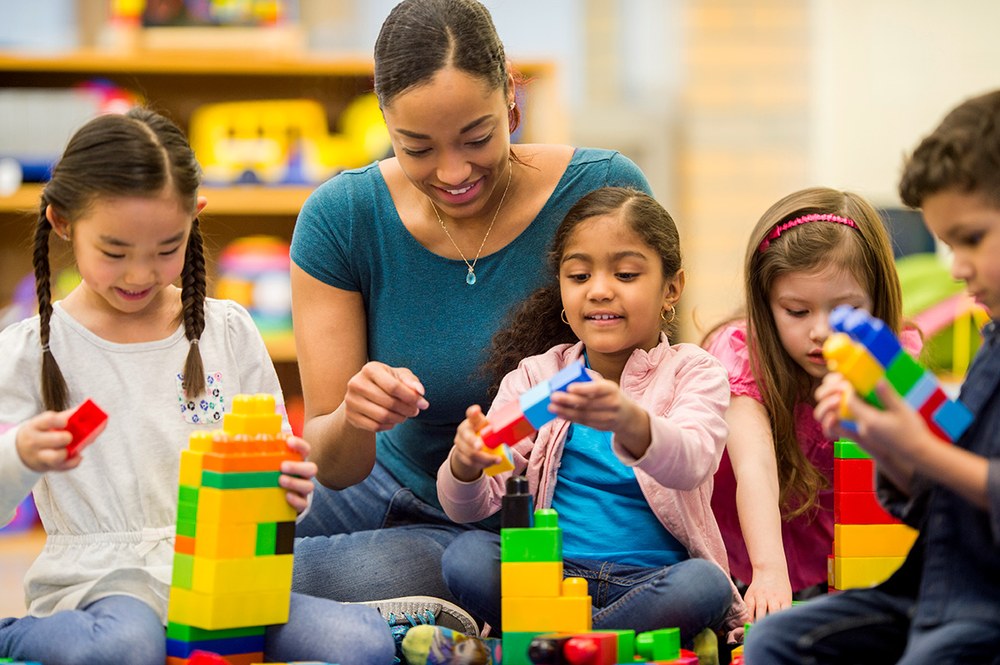Posted: April 3, 2024
Problem-solving is a social-emotional learning (SEL) skill children need for lifelong success. Effective problem-solving skills support children's ability to self-regulate, focus on tasks, think flexibly and creatively, work with others, and generate multiple ways to solve problems. When young children develop and build these skills, it positively impacts their interactions with others, grows their capacity to manage challenges, and boosts a sense of competence.

A group of school-age children are stacking plastic blocks with an educator.
The foundation for effective social problem-solving is grounded in self-regulation, or the ability to regulate emotions when interacting with others. It is easier to focus on one's feelings and the feelings and perspectives of others and to work cooperatively toward solutions when a child can self-regulate and calm down. Children develop self-regulation skills over time, with practice and with adult guidance. Equally important is how an adult models emotion regulation and co-regulation.
"Caregivers play a key role in cultivating the development of emotion regulation through co-regulation, or the processes by which they provide external support or scaffolding as children navigate their emotional experiences" (Paley & Hajal, 2022, p. 1).
When adults model calm and self-regulated approaches to problem-solving, it shows children how to approach problems constructively. For example, an educator says, "I'm going to take a breath and calm down so I can think better." This model helps children see and hear a strategy to support self-regulation.
Problem-solving skills help children resolve conflicts and interact with others as partners and collaborators. Developing problem-solving skills helps children learn and grow empathy for others, stand up for themselves, and build resilience and competence to work through challenges in their world.
Eight strategies to support problem-solving
- Teach about emotions and use feeling words throughout the day. When children have more words to express themselves and their feelings, it is easier to address and talk about challenges when they arise.
- Recognize and acknowledge children's feelings throughout the day. For example, when children enter the classroom during circle time, mealtime, and outside time, ask them how they feel. Always acknowledge children's feelings, both comfortable and uncomfortable, to support an understanding that all feelings are OK to experience.
- Differentiate between feelings and behaviors. By differentiating feelings from behaviors, educators contribute to children’s understanding that all feelings are OK, but not all behaviors are OK. For example, an educator says, "It looks like you may be feeling mad because you want the red blocks, and Nila is playing with them. It's OK to feel mad but not OK to knock over your friend’s blocks."
- Support children's efforts to calm down. When children are self-regulated, they can think more clearly. For example, practice taking a breath with children as a self-regulation technique during calm moments. Then, when challenges arise, children have a strategy they have practiced many times and can use to calm down before problem-solving begins.
- Encourage children's efforts to voice the problem and their feelings after they are calm. For example, when a challenge arises, encourage children to use the phrase, "The problem is_______, and I feel______." This process sets the stage to begin problem-solving.
- Acknowledge children's efforts to think about varied ways to solve problems. For example, an educator says, "It looks like you and Nila are trying to work out how to share the blocks. What do you think might work so you can both play with them? Do you have some other ideas about how you could share?"
- Champion children's efforts as they problem-solve. For example, "You and Nila thought about two ways you could share. One way is to divide the red blocks so you can each build, and the other is to build a tower together. Great thinking, friends!"
- Create opportunities for activities and play that offer problem-solving practice. For example, when children play together in the block area, it provides opportunities to negotiate plans for play and role-play, build perspective, talk about feelings, and share. The skills children learn during play, along with adult support, enhance children’s ability to solve more complex and challenging social problems and conflicts when they occur in and out of the early learning setting.
References:
Paley, B., & Hajal, N. J. (2022). Conceptualizing emotion regulation and coregulation as family-level phenomena. Clinical Child and Family Psychology Review, 25(1), 19-43.

